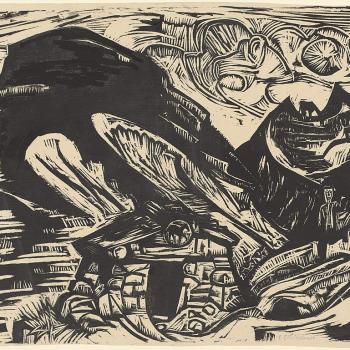As I’ve hinted previously, systematic theology has more-or-less failed to do it for me. Whether it’s because my experience of the world seems fragmented and broken, or simply because my mind lends itself to the celebration of mystery as opposed to its elucidation, I’ve preferred the mystics for as long as I can remember. Kierkegaard’s thought is far from a clear system; in fact, it stands as a challenge to Hegel’s all-encompassing systematic approach. And anyone who has read Nietzsche can tell you that his scattered aphorisms and pseudo-poetical mode look very little like most of what is called philosophy today, especially in the Anglo-American sphere. Once could say that Continental, rather than Analytic, philosophy has long spoken to my mind.
While I love picking up the Summa its exegetes tend to leave me annoyed; while I love rigorous theological discourse the faith has always, for me, remained a mystery to be experienced far more than a sphere to be understood rationally. Aquinas’ late-in-life remark about his thought and straw comes to mind. Witness Kierkegaard: “But who is the systematic thinker? Well, it is he who himself is outside existence and yet in existence, who in his eternity is forever concluded and yet includes existence within himself…it is God.” In short, I wanted a faith to live and experience, not one to write about (how ironic).
Julian of Norwich (the long version of her text, whence I will quote, can be found here) was probably the first actual mystic I read, the first writer who exemplified the tropes I’ve since come to find so compelling: the ineffability of God, the need for affirmation of God’s attributes, which we then negate to understand his absolute transcendence, and an emphasis on paradox. More important than any one thing she said was her mindset, her hermeneutic, or way of looking at the world. Her recasting of the Fall narrative might help here. In this vision, Julian sees a lord (God) and a servant (Adam / man). The servant is so eager to do his master’s bidding that he trips and falls, becoming so absorbed in his own pain, in his own concerns, that he forgets the lord, whose bidding he initially sought to do. In pity, this master sends comfort, as he sorrows over his self-absorbed servant:
And this was a beginning of teaching which I saw in the same time, whereby I might come to know in what manner He beholdeth us in our sin. And then I saw that only Pain blameth and punisheth, and our courteous Lord comforteth and sorroweth; and ever He is to the soul in glad Cheer, loving, and longing to bring us to His bliss. The place that the Lord sat on was simple, on the earth, barren and desert, alone in wilderness; his clothing was ample and full seemly, as falleth to a Lord; the colour of his cloth was blue as azure, most sad and fair. [H]is cheer was merciful; the colour of his face was fair-brown,—with full seemly features; his eyes were black, most fair and seemly, shewing [outward] full of lovely pity, and [shewing], within him, an high Regard, long and broad, all full of endless heavens. And the lovely looking wherewith He looked upon His Servant continually,—and especially in his falling,—methought it might melt our hearts for love and burst them in two for joy. The fair looking shewed [itself] of a seemly mingledness which was marvellous to behold: the one [part] was Ruth and Pity, the other was Joy and Bliss. The Joy and Bliss passeth as far Ruth and Pity as Heaven is above earth: the Pity was earthly and the Bliss was heavenly: the Ruth and Pity of the Father was [in regard] of the falling of Adam, which is His most loved creature; the Joy and Bliss was [in regard] of His dearworthy Son, which is even with the Father. The Merciful Beholding of His Countenance of love fulfilled all earth and descended down with Adam into hell, with which continuant pity Adam was kept from endless death. And thus Mercy and Pity dwelleth with mankind unto the time we come up into Heaven. But man is blinded in this life and therefore we may not see our Father, God, as He is. And what time that He of His goodness willeth to shew Himself to man, He sheweth Himself homely, as man.
“[M]ethought it might melt our heart for love and burst them in two for joy.” These were the sorts of words I did not hear enough in the world, a world seemingly pitiless and selfish. What Julian captured for me was God’s love for us, not a love to be delimited, even really understood, but to be accepted (in our unworthiness) and given over to brothers and sisters in order to be a light in a world filled with pain, to recognize and indicate every tiny blessing from the miracle of life itself to inexplicable healings. In a word, Julian recasts the Fall narrative from its dourness into love, without losing the truth that man sinned and fell; her exegesis, though literary and not analytic, presented me with an unfathomable truth: God is calling us; our duty as Christians is to answer that call in love. She continues:
And in this endless Love man’s Soul is kept whole, as the matter of the Revelations signifieth and sheweth: in which endless Love we be led and kept of God and never shall be lost. For He willeth we be aware that our Soul is a life, which life of His Goodness and His Grace shall last in Heaven without end, Him loving, Him thanking, Him praising. And right the same that we shall be without end, the same we were treasured in God and hid, known and loved from without beginning.













